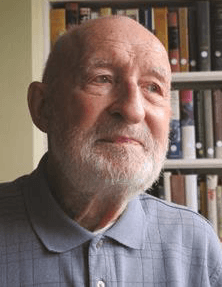
Albert J. Schmidt. Photo: Michael Dolan
Historian Albert J. Schmidt died on January 18, 2025. Born in the Germantown neighborhood of Louisville, Kentucky, on August 27, 1925, Schmidt came of age during World War II and enlisted in the US Army Air Forces in 1943. He completed his first year at DePauw University before being called to duty in New Guinea and the Philippines.
Following his graduation from DePauw in 1949, Schmidt entered the doctoral program in history at the University of Pennsylvania. In 1950, during his second year, he became a life member of the American Historical Association. His doctoral research was completed during a Fulbright year at the University of London in 1952–53, and he earned his PhD in 1953. His dissertation, “Thomas Wilson, Tudor Scholar and Statesman,” led to several articles that enhanced our understanding of early modern British history. A relatively unknown figure, Wilson played a central role in Queen Elizabeth I’s government as secretary of state, advising her on domestic and foreign matters, managing her correspondence, engaging in diplomatic and military missions, and overseeing her secret service. Because earlier historians had focused on Tudor secretaries such Thomas Cromwell, William Cecil, and Francis Walsingham, Schmidt had the opportunity to make a significant contribution to the field with his studies of Wilson’s career.
Schmidt taught history at Coe College in Cedar Rapids, Iowa, from 1953 to 1965 and at the University of Bridgeport (UB) in Connecticut from 1965 to 1990, where he served as the Arnold J. Bernhard Professor of History. At UB, he chaired the history department and served as dean of the College of Arts and Sciences, vice president of academic affairs, and, from 1978 to 1990, professor of law. He received UB’s Scholar of the Year award in 1969 and was the recipient of numerous prestigious grants and fellowships.
In the early 1960s, Schmidt retooled himself as a scholar. Deeply affected by the Hungarian revolution of 1956, he delved into Russian history. In 1960–62, he studied Russian history and language at Indiana University’s Russian and East European Institute and at Moscow University. He also embarked on a new scholarly project focusing on Russian architecture and town planning during the era of Catherine the Great (1762–96) and her successors. This resulted in a book, The Architecture and Planning of Classical Moscow: A Cultural History (American Philosophical Society, 1989), half a dozen scholarly articles, and an unpublished book manuscript. The book explores Catherine’s quest to create an orderly urban environment that harnessed architecture and town design to her goals of controlling urban society and emphasizing Russian identity as a Western power. Although the role of her predecessor, Peter the Great, in establishing Saint Petersburg was widely known, Catherine’s rebuilding of Moscow had been little explored before this book. Schmidt’s unpublished manuscript, “Provincial Russian Urbanism: Shaping Catherine the Great’s Imperial Space (1760–96),” moved to the provinces of central Russia, where Catherine transformed the appearance of some 400 towns and cities, replacing local architectural styles with a uniform Russian one that underscored their subordination to Catherine’s imperial power. Many of these cities served as new administrative centers that allowed the Russian autocracy to extend its imperial reach.
Schmidt’s interest in legal history, which included a year as a student at the New York University Law School, led to two more research fields. Schmidt returned to Lincolnshire, the home of Wilson, to investigate the emergence of the country attorney as a profession in the late 18th century. In the late 1980s, during the Soviet periods of glasnost and perestroika, Schmidt joined a team of scholars who organized conferences and edited books on these developments’ impact on Soviet law.
After he retired from teaching, Schmidt served with the Organization for Security and Co-operation as an elections supervisor in Bosnia (1997 and 1998) and Kosovo (2000), where he helped to ensure that voting was free and fair. He also held a one-month lectureship at the University of Lviv in Ukraine (1998). As a resident of Washington, DC, in his retirement, Schmidt was a regular attendee of events at the Woodrow Wilson International Center for Scholars and George Washington University’s Institute for European, Russian, and Eurasian Studies, where he was a visiting scholar. He was also a dedicated member of the League of Women Voters lobby corps and a docent at the National Portrait Gallery. Schmidt’s publications, photographs, and documents are available in the DePauw University Archives and at albert-schmidt.com.
Elizabeth Schmidt
Loyola University of Maryland (emerita)
This work is licensed under a Creative Commons Attribution-NonCommercial-NoDerivatives 4.0 International License. Attribution must provide author name, article title, Perspectives on History, date of publication, and a link to this page. This license applies only to the article, not to text or images used here by permission.